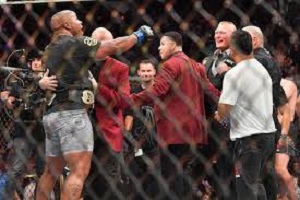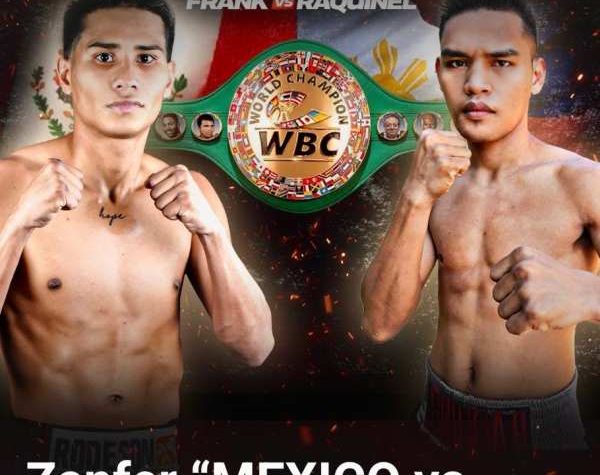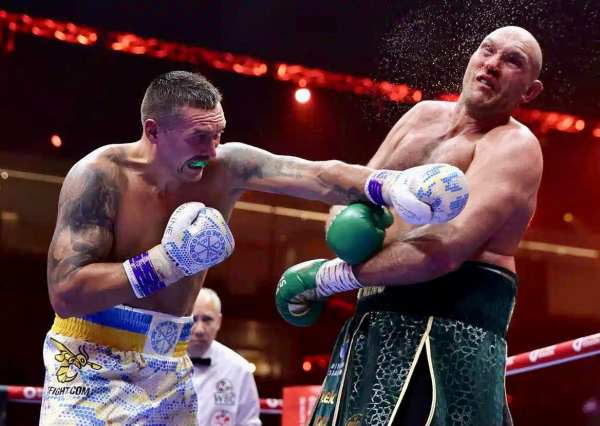
By Mike Chiappetta@MikeChiappetta
MMAfighting.com
With his hulking build and global renown, Brock Lesnar brings a certain, predictable buzz to whatever he does, a natural magnetism that draws people to him. It’s a phenomenon that’s as real as a shadow, and something Daniel Cormier was banking on to pad his retirement accounts before he walked away from mixed martial arts for good sometime in 2019.
July 2018 seems like an eternity ago in MMA, but it was then that Lesnar and Cormier pushed and shoved each other in a cage, setting the table for what was supposed to be a huge moneymaker for both. This, it seemed, was a foregone conclusion.
And then the UFC’s financial floor was yanked from beneath them. The organization signed a pair of deals with ESPN that changed the UFC’s entire business model. Instead of being the pay-per-view-reliant organization that it’s been for its entire existence, the UFC can now count on hundreds of millions per year in guaranteed money from its television partner, including a lucrative licensing fee to exclusively broadcast the promotion’s pay-per-view cards to homes around the U.S. This essentially means that the UFC can already begin counting PPV revenue before selling a single one. Which essentially means that superstars like Lesnar do not have the same leverage they once held.
According to MMA Fighting’s Dave Meltzer, the new dynamic played a key role in Lesnar’s decision to retire from the sport and stick with professional wrestling.
Reporting in his Wrestling Observer newsletter, Meltzer wrote, “Lesnar had a certain price he wanted guaranteed to do the Cormier fight. UFC, which, with its ESPN deal where the PPV money is guaranteed, didn’t meet the offer. Lesnar had a certain price he wanted that was worth it to him to go through a hard training camp at 42 and then get into the cage with an all-time great fighter and athlete in Cormier. Plus, WWE has continued to offer Lesnar strong deals for limited dates, and on a Lesnar schedule, pro wrestling is far safer and offers considerably more longevity.”
On Saturday night, the UFC confirmed its plan B: Cormier will defend the heavyweight championship in a rematch against Stipe Miocic.
It is a perfectly good fight. In fact, it’s probably the fairest fight matchmakers could whip up. Lesnar was only in the mix to pop a big buy rate. Perhaps unbelievably, he has only fought a single time since the start of 2012. Worse, his last official victory came in July 2010, when he overcame a hellacious first-round mauling to choke out Shane Carwin. His participation in a title match as challenger would have been a farce. Still, many were on board with it out of respect for Cormier, who certainly deserves a monster payday.
Miocic, meanwhile, had been a dominant champion until his collision with Cormier’s fists. He’s been top flight, and so a rematch, while not thrilling, is fine.
But what about after that? Isn’t it fair to wonder how this new landscape has shifted things, perhaps immutably? This ESPN deal is locked in for seven years. It’s worth wondering, would Lesnar have made this same decision if he’d been 10 years younger? And the answer is, probably.
With UFC accepting millions from ESPN in guaranteed revenue, there is not nearly the same urgency to make the bold moves that were UFC staples. Whether you think that’s good or bad is strictly subjective. Some will note that hotshot bookings are a longtime piece of prizefighting that draw in the masses; others may counter that qualified contenders may now be less likely to be passed over.
That remains to be seen. What we do know is that as Lesnar bids the MMA world adieu, the aftershocks of the ESPN deal rattle the cage.
For instance, we continue to wonder how exactly the UFC will come to terms with one of its only fighters to outsell Lesnar.
Conor McGregor wants to fight again. He has made that clear to anyone who follows him on social media. Yet when McGregor made it known, the UFC followed by proposing a co-main event slot.
Think about this: McGregor has headlined five of the top six selling UFC pay-per-views of all-time. And this: fighters who have headlined UFC pay-per-views within the last 12 months include Anthony Smith, Raquel Pennington, Al Iaquinta, and Darren Till. And they can’t find a main-event slot for him?
While the UFC does prefer to headline events with championship fights, there is not a single title bout with any two names that will outdraw McGregor. The UFC, of course, intimately knows this; you can guarantee that its proposal was at least in part a message to McGregor regarding his value within the new financial landscape.
And that should worry fans. If the incentive to keep its most popular fighter ever has lessened, perhaps we should prepare to experience disappointment, or at least, expect more unrest near the top. In years gone by, the pay-per-view draws were the one class of fighters who at least had some control of their earnings. Every extra buy they brought in meant more money in their pocket. Now, they have to hope casual fans will go through not one, but two paywalls in order to get that money. Now, even the best and most popular fighters have an artificial wall between a maximum payday.
Many of them will continue to compete as though nothing has changed. They are here to prove they are the best, and nothing will dissuade them from that path. But even those fighters, in their quiet moments, may at some point look at business and what they’re working toward, and ask whether it’s worth it. As a former champion showed with his decision this week, that is a problem. As it turns out, even in his wake, Lesnar leaves both shadow and aftershock.





More News
Casimero TKO’s Sanchez in 1st round
Raquinel wins WBC Continental Americas super flyweight title
Frank vs Raquinel on ABEMA LIVE PPV